Debt-ridden Chinese property developer Country Garden Holdings said Tuesday that it had failed to make a principal payment of HK$470 million ($60 million) by the deadline.
The company did not elaborate on details about the payment but admitted that a future default is likely as it may “not be able to meet all of its offshore payment obligations when due or within the relevant grace periods, including but not limited to those under the U.S. dollar notes.”





